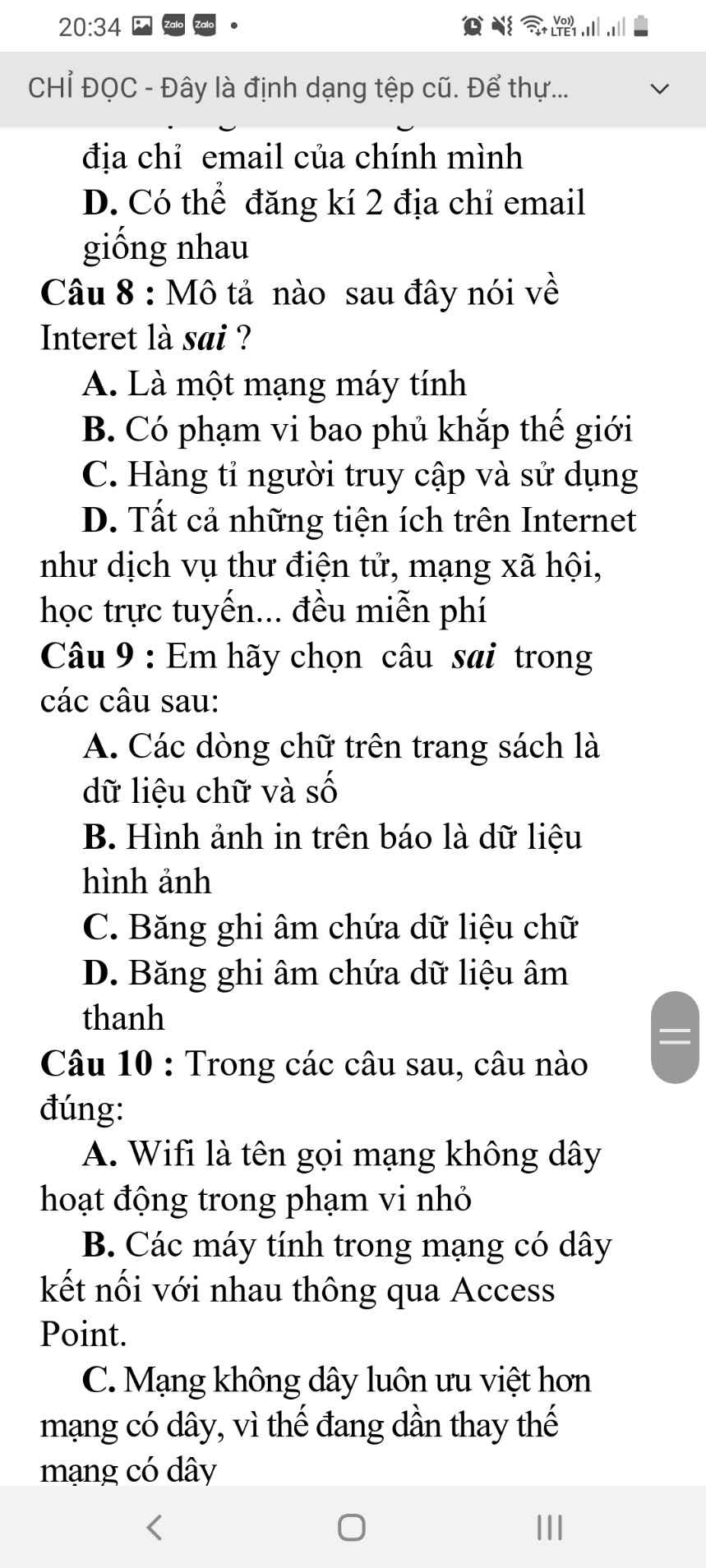2x^2 - 3/4x=0
Giúp mình nha,mình cần gấp lém >^<
A= 4x^3 + x - 2022 tại |x| = 2
B= 19 - 2x^ có giá trị = 1
C= (x+2) (x^2-4) có giá trị = 0
giúp mình với mình đang cần gấp
\(\left|x\right|=2\Rightarrow\left[{}\begin{matrix}x=-2\\x=2\end{matrix}\right.\)
Thay x=-2 vào B ta có:
\(B=4x^3+x-2022=4.\left(-2\right)^3+\left(-2\right)-2022=-32-2-2022=-2056\)
Thay x=2 vào B ta có:
\(B=4x^3+x-2022=4.2^3+2-2022=32+2-2022=-1988\)
a) x^2 - 25 - 3 *(x - 5) =0
b) (3x + 1 )^2 = (2x - 5 )
c) 2x^2 - 7x + 6 = 0
giúp mình vs
*đừng giải tắt nha*
mình cần gấp
a. \(x^2-25-3.\left(x-5\right)=0\\ \Leftrightarrow\left(x-5\right)\left(x+5\right)-3.\left(x-5\right)=0\\ \Leftrightarrow\left(x-5\right)\left(x+5-3\right)=0\\ \Leftrightarrow\left[{}\begin{matrix}x-5=0\\x+2=0\end{matrix}\right.\Leftrightarrow\left[{}\begin{matrix}x=5\\x=-2\end{matrix}\right.\)
b. \(\left(3x+1\right)^2=\left(2x-5\right)\\ \Leftrightarrow9x^2+6x+1=2x-5\\ \Leftrightarrow9x^2+6x-2x=-5-1\\ \Leftrightarrow9x^2+4x=-6\\ \Leftrightarrow x\left(9x+4\right)=-6\\ \Leftrightarrow\left[{}\begin{matrix}x=-6\\9x+4=-6\end{matrix}\right.\Leftrightarrow\left[{}\begin{matrix}x=-6\\x=-\dfrac{10}{9}\end{matrix}\right.\)
c. \(2x^2-7x+6=0\\ \Leftrightarrow2x^2-7x=-6\\ \Leftrightarrow x\left(2x-7\right)=-6\\ \Leftrightarrow\left[{}\begin{matrix}x=-6\\x=\dfrac{1}{2}\end{matrix}\right.\)
a, \(\left(x-5\right)\left(x+5\right)-3\left(x-5\right)=0\Leftrightarrow\left(x-5\right)\left(x+2\right)=0\Leftrightarrow x=-2;x=5\)
b, bạn ktra lại đề, thường thường ngta hay cho 2 vế cùng bình phương
c, \(2x^2-7x+6=0\Leftrightarrow\left(2x-3\right)\left(x-2\right)=0\Leftrightarrow x=\dfrac{3}{2};x=2\)
\(\left(3x+1\right)^2=\left(2x-5\right)^2\)
\(\left[{}\begin{matrix}3x+1=2x-5\\3x+1=5-2x\end{matrix}\right.\Leftrightarrow\left[{}\begin{matrix}x=-6\\5x=4\end{matrix}\right.\Leftrightarrow\left[{}\begin{matrix}x=-6\\x=\dfrac{4}{5}\end{matrix}\right.\)
Tìm x biết:
-2/5 x (3 - 4x) mũ 2 + 5/18 = 0
Giúp mình nhé mình đang cần gấp!
\(\Leftrightarrow-\dfrac{2}{5}\left(4x-3\right)^2=-\dfrac{5}{18}\)
\(\Leftrightarrow\left(4x-3\right)^2=\dfrac{25}{36}\)
\(\Leftrightarrow4x-3\in\left\{\dfrac{5}{6};-\dfrac{5}{6}\right\}\)
hay \(x\in\left\{\dfrac{23}{24};\dfrac{13}{24}\right\}\)
a) 1-(5/3/8+x-7/5/24)=16/2/3=0
Giúp mình nha mình đg cần gấp
\(a,1-\left(\dfrac{\dfrac{5}{3}}{8}+x-\dfrac{\dfrac{7}{5}}{24}\right)-\dfrac{\dfrac{16}{2}}{3}=0\\ \Leftrightarrow1-\left(\dfrac{5}{24}+x-\dfrac{7}{120}\right)=\dfrac{8}{3}\\ \Leftrightarrow\dfrac{3}{20}+x=1-\dfrac{8}{3}=-\dfrac{5}{3}\\ \Leftrightarrow x=-\dfrac{5}{3}-\dfrac{3}{20}=-\dfrac{109}{60}\)
Ta có: \(1-\left(\dfrac{5}{\dfrac{3}{8}}+\dfrac{x-7}{\dfrac{5}{24}}\right)-\dfrac{16}{\dfrac{2}{3}}=0\)
\(\Leftrightarrow\dfrac{40}{3}+\dfrac{24\left(x-7\right)}{5}=23\)
\(\Leftrightarrow\left(x-7\right)\cdot\dfrac{24}{5}=\dfrac{29}{3}\)
\(\Leftrightarrow x-7=\dfrac{145}{72}\)
hay \(x=\dfrac{649}{72}\)
Bài1: giải các pt sau:
a, 3-4x+24+6x= x+27+3x
b, 5-(6-x)=4(3-2x)
c, x-(x+1)/3 = (2x+1)/5
d,(2x-1)/3 - (5x+2)/7 = x+13
Bài 2:
a, (x-1)(3x+1)=0
b, (x-5)(7-x)=0
c, ( x-1)(x+5)(-3x+8)=0
d, x(x^2 - 1 )=0
Giúp mình 2 bài này với , mình đang cần gấp , CẢM ƠN M.N ạ><
2:
a: =>x-1=0 hoặc 3x+1=0
=>x=1 hoặc x=-1/3
b: =>x-5=0 hoặc 7-x=0
=>x=5 hoặc x=7
c: =>\(\left[{}\begin{matrix}x-1=0\\x+5=0\\3x-8=0\end{matrix}\right.\Leftrightarrow x\in\left\{1;-5;\dfrac{8}{3}\right\}\)
d: =>x=0 hoặc x^2-1=0
=>\(x\in\left\{0;1;-1\right\}\)

mình cần gấp ai làm nhanh mình tick nha ( gấp lém ) !!!!!!!!!!!!!!
a) (3x-1).(2x+7)-(x+1).(6x-5)=7
b) (x+1)^3-x.(x-2)^2+x-1=0
c) (x+2).(x^2-2x+4)-x(x^2+3)
d) 2x.(x-3)-5.(3-x)=0
giúp mình ạ cần gấp
b) (x+1)^3-x(x-2)^2+x-1=0
⇔x^3+3x^2+3x+1-(x^3-4x^2+4x)=0
⇔ x^3+3x^2+3x+1-x^3+4x^2-4x+x-1=0
⇔7x^2-2=0
⇔7x^2=2
⇔7x^2=-2⇔x=-3
⇔7x^2=2⇔x=-căn 5
giải pt:
a) x^4+4x³+6x²+4x+ căn(x²+2x+10)=2
b) x²=căn(x³-x²)+căn(x²-x)
c) căn(x-1)+căn(3-x) + x²+2x-3- √2=0
GIÚP MÌNH
a) PT \(\Leftrightarrow\left(x+1\right)^4+\sqrt{\left(x+1\right)^2+9}=3\).
Ta có \(\left(x+1\right)^4+\sqrt{\left(x+1\right)^2+9}\ge\sqrt{9}=3\).
Đẳng thức xảy ra khi và chỉ khi x = -1.
Vậy..
b) \(x^2=\sqrt{x^3-x^2}+\sqrt{x^2-x}\)
Đk: \(\left\{{}\begin{matrix}x^3-x^2\ge0\\x^2-x\ge0\end{matrix}\right.\)\(\Leftrightarrow\left\{{}\begin{matrix}x^2\left(x-1\right)\ge0\\x\left(x-1\right)\ge0\end{matrix}\right.\)\(\Leftrightarrow\left\{{}\begin{matrix}\left[{}\begin{matrix}x\ge1\\x=0\end{matrix}\right.\\\left[{}\begin{matrix}x\ge1\\x\le0\end{matrix}\right.\end{matrix}\right.\)\(\Leftrightarrow\left[{}\begin{matrix}x=0\\x\ge1\end{matrix}\right.\)
Thay x=0 vào pt thấy thỏa mãn => x=0 là một nghiệm của pt
Xét \(x\ge1\)
Pt \(\Leftrightarrow x^4=\left(\sqrt{x^3-x^2}+\sqrt{x^2-x}\right)^2\le2\left(x^3-x\right)\) (Theo bđt bunhiacopxki)
\(\Leftrightarrow x^4\le2x\left(x^2-1\right)\le\left(x^2+1\right)\left(x^2-1\right)=x^4-1\)
\(\Leftrightarrow0\le-1\) (vô lí)
Vậy x=0
c) \(\sqrt{x-1}+\sqrt{3-x}+x^2+2x-3-\sqrt{2}=0\) (đk: \(1\le x\le3\))
Xét x-1=0 <=> x=1 thay vào pt thấy thỏa mãn => x=1 là một nghiệm của pt
Xét \(x\ne1\)
Pt\(\Leftrightarrow\dfrac{x-1}{\sqrt{x-1}}+\dfrac{1-x}{\sqrt{3-x}+\sqrt{2}}+\left(x-1\right)\left(x+3\right)=0\)
\(\Leftrightarrow\left(x-1\right)\left(\dfrac{1}{\sqrt{x-1}}-\dfrac{1}{\sqrt{3-x}+\sqrt{2}}+x+3\right)=0\) (1)
Xét \(\dfrac{1}{\sqrt{x-1}}-\dfrac{1}{\sqrt{3-x}+\sqrt{2}}+x+3\)
Có \(\sqrt{3-x}+\sqrt{2}\ge\sqrt{2}\)
\(\Leftrightarrow\dfrac{-1}{\sqrt{3-x}+\sqrt{2}}\ge-\dfrac{1}{\sqrt{2}}\)
Có \(\left\{{}\begin{matrix}\dfrac{1}{\sqrt{x-1}}>0\\x+3\ge4\end{matrix}\right.\) \(\Rightarrow\dfrac{1}{\sqrt{x-1}}-\dfrac{1}{\sqrt{3-x}+\sqrt{2}}+x+3>0-\dfrac{1}{\sqrt{2}}+4>0\)
Từ (1) => x-1=0 <=> x=1
Vậy pt có nghiệm duy nhất x=1
2/ x^4 + 2x^3 - x^2 – 2x+1=0
3/ X^4 - 4x^3 - 9x^2 + 8x +4=0
Mình đang cần hơi gấp, mọi người giúp mình nha yêu :33
`2)x^4+2x^3-x^2-2x+1=0`
`<=>x^4+2x^3+x^2-2x^2-2x+1=0`
`<=>(x^2+x)^2-2(x^2+x)+1=0`
`<=>(x^2+x-1)^2=0`
`<=>x^2+x-1=0`
`\Delta=1+4=5`
`=>x_{1,2}=(-1+-sqrt5)/2`
Vậy `S={(-1+sqrt5)/2,(-1+sqrt5)/2`
`3)x^4-4x^3-9x^2+8x+4=0`
`<=>x^4-x^3-3x^3+3x^2-12x^2+12x-4x+4=0`
`<=>(x-1)(x^3-3x^2-12x-4)=0`
`<=>(x-1)(x^3+2x^2-5x^2-10x-2x-4)=0`
`<=>(x-1)(x+2)(x^2-5x-10)=0`
`+)x=1`
`+)x=-2`
`+)x^2-5x-10=0`
`Delta=25+40=65`
`=>x_{12}=(5+sqrt{65})/2`